Choose your Bitcoin wallet
Find your wallet and start making payments with merchants and users.
Take time to educate yourself
Bitcoin is different from what you know and use every day. Before you start using Bitcoin for any serious transaction, be sure to read what you need to know and take appropriate steps to secure your wallet. Always remember that it is your responsibility to choose your wallet carefully and adopt good practices in order to protect your money.
Which is the Best Bitcoin Wallet?
This guide will help you to find the best Bitcoin wallet for YOU!
There's no "one size fits all" Bitcoin wallet. Wallets come on different platforms with different features.
If you want the best possible wallet, keep reading.
Select Your Preferences
Wallet Finder
Just enter your wallet preferences and we'll show you the best wallet for your needs.
Recommendations
 Ledger Nano S Buy Learn More
Ledger Nano S Buy Learn More
The Ledger Nano S is the cheapest hardware wallet. Hardware wallets secure your coins by storing them offline and away from hackers. The Ledger Nano S supports more coins than any other hardware wallet, like bitcoin, litecoin, ether and more. It can be used with any desktop computer or Android device.
 TREZOR Buy Learn More
TREZOR Buy Learn More
TREZOR launched in August 2014 as the first Bitcoin hardware wallet, offering secure bitcoin storage plus the ability to spend with the convenience of a hot wallet. TREZOR is a small, thumb-sized device.
 Samourai Wallet
Samourai Wallet
Samourai is 100% the best available Android wallet. It has the most features, the best privacy and its developers are constantly working to add the latest Bitcoin features to the wallet. Samourai Wallet has been around for more than 3 years and its code is fully open source.
 Coinomi
Coinomi
Coinomi is the most popular multi-coin cryptocurrency wallet for iOS and Android. It supports over 100+ coins including bitcoin, litecoin, ether, dash and more.
 BRD
BRD
BRD is a mobile wallet for both Android and iOS. Its clean interface makes it easy to use for beginners. It supports bitcoin and ether.
 Electrum
Electrum
Electrum wallet is an easy to use desktop wallet for Mac, Windows and Linux. It's east and fast to setup so you can start sending and receiving bitcoins right away.
 Exodus
Exodus
Exodus is the most popular multi-coin cryptocurrency wallet. It supports Bitcoin, ether, litecoin, dash, Golem and many more.
What is a Bitcoin Wallet?
A Bitcoin wallet is the first step to using Bitcoin.
A “wallet” is basically the Bitcoin equivalent of a bank account. It allows you to receive bitcoins, store them, and then send them to others.
You can think of a wallet as your personal interface to the Bitcoin network, similar to how your online bank account is an interface to the regular monetary system.
Bitcoin wallets contain private keys; secret codes that allow you to spend your bitcoins.
In reality, it’s not bitcoins that need to be stored and secured, but the private keys that give you access to them.
A Bitcoin wallet is simply an app, website, or device that manages Bitcoin private keys for you.
This guide will show you how to create a bitcoin wallet and pick the best one.
Types of Bitcoin Wallets
Let's discuss the types of bitcoin wallets and why you might want to use one kind over another.
Hardware Wallets
A hardware wallet is a physical electronic device, built for the sole purpose of securing bitcoins.
The core innovation is that the hardware wallet must be connected to your computer, phone, or tablet before bitcoins may be spent.
The three most popular and best Bitcoin hardware wallets are:
Hardware wallets are a good choice if you’re serious about security and convenient, reliable Bitcoin storage.
Bitcoin hardware wallets keep private keys separate from vulnerable, internet-connected devices.
Your all-important private keys are maintained in a secure offline environment on the hardware wallet, fully protected even should the device be plugged into a malware-infected computer.
As bitcoins are digital, cyber-criminals could, potentially, target your computer’s “software wallet” and steal them by accessing your private key.
Generating and storing private keys offline using a hardware wallet ensures that hackers have no way to reach your bitcoins.
Hackers would have to steal the hardware wallet itself, but even then, it can be protected with a PIN code.
Don’t worry about your hardware wallet getting stolen, lost or damaged either; so long as you create a secret backup code, you can always retrieve your bitcoins.
Think of a hardware wallet like your own underground steel vault. If you own a significant amount of bitcoin, you should strongly consider getting one!
Why are hardware wallets good?
- Easiest way to securely store bitcoins
- Easy to backup and secure
- Less margin for error; setup is easy even for less technical users
Why are hardware wallets bad?
- They're not free!
Hot Wallets
Hot wallets are Bitcoin wallets that run on internet connected devices like a computer, mobile phone, or tablet.
Private keys are secret codes. Because hot wallets generate your private keys on an internet connected device, these private keys can’t be considered 100% secure.
Think of a hot wallet like your wallet today: you use it to store some cash, but not your life savings. Hot wallets are great if you make frequent payments, but not a good choice for the secure storage of bitcoins.
Why are hot wallets good?
- Easiest way to store small amounts of bitcoin
- Convenient; spending and receiving payments is easy and fast
- Some hot wallets allow access to funds across multiple devices
Why are hot wallets bad?
- Not safe for the secure storage of large amounts of bitcoins
Which Wallet is Best for You?
Investing or saving? Then a hardware wallet will keep your coins safe.
Otherwise, a software wallet will send and receive bitcoins just fine. Best of all, software wallets are free.
Each wallet has pros and cons, and different wallets are built to solve different problems.
Here is a video that may help:
Some wallets may be geared towards security, while some wallets may be more focused on privacy.
Your specific needs should determine the wallet you use, as there is no “best bitcoin wallet”.
Below, we've listed wallets you can buy or download. We suggest using the wallets listed or doing research before buying or downloading any wallet.
Each day, new Bitcoin scam wallets are added to the Google Play Store and Apple app store that are designed to steal peoples' bitcoins.
We only list wallets that have published and open-sourced their code.
Hardware Wallets: Keep Your Coins Safe
Hardware wallets aren't free.
But the price can be worth it if you own a significant amount of bitcoins. A hardware wallet will protect a few hundred in Bitcoin just as effectively as a few million.
How Hardware Wallets Work
Hardware wallets are secure, offline devices. They store your private keys offline so they can't be hacked.
This means you can even use one on a malware infected computer.
Why A Hardware Wallet with a Screen is Important
In the table below, you'll notice we show which hardware wallets have screens.
Screens provide extra security by verifying and displaying important wallet details. Since the hardware wallet is nearly impossible to hack, its screen is more trustworthy than data displayed on your computer.
Bitcoin Hardware Wallet Comparison
Check the table below for a quick comparison. Note:


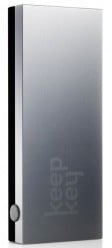
Best Bitcoin Hardware Wallet Overviews
 Ledger Nano S Buy Learn More
Ledger Nano S Buy Learn More
The Ledger Nano S is the cheapest of the three hardware wallets with a screen; it costs about $95. Ledger, one of the most well-known Bitcoin security companies, released the device in August 2016.
 TREZOR Buy Learn More
TREZOR Buy Learn More
TREZOR launched in August 2014 as the first Bitcoin hardware wallet, offering secure bitcoin storage plus the ability to spend with the convenience of a hot wallet. TREZOR is a small, thumb-sized device.
 KeepKey Buy Learn More
KeepKey Buy Learn More
KeepKey was released in September 2015 and was the second hardware Bitcoin wallet to offer a screen. The KeepKey's larger screen gives it some extra security features that the Nano S and Trezor lack.
Hot Wallets
Just a quick refresher:
Hot wallets are Bitcoin wallets that run on internet connected devices like a computer, mobile phone, or tablet. As hot wallets generate private keys on an internet connected device, these private keys can’t be considered 100% secure.
Think of a hot wallet like your wallet today: you use it to store some cash, but not your life savings. Hot wallets are great if you make frequent payments, but not a good choice for the secure storage of bitcoins.
Online Bitcoin Wallets (Web Wallets)
Web wallets store your private keys online, where they are encrypted with a user-selected password. Although they offer the lowest level of security, online bitcoin wallets have the advantage of being accessible from any internet connected device.
 GreenAddress
GreenAddress
GreenAddress is a multi-signature Bitcoin wallet available on the web, desktop, Android, and iOS. GreenAddress is compatible with hardware wallets like TREZOR, Ledger Nano, and the HW.1.
“Multi-signature” in this context means that the site requires a manual confirmation from you for your coins to be moved; this greatly improves security.
Android Bitcoin Wallets
There is a large selection of Android wallets. Since Bitcoin wallets were originally banned by Apple, developers spent much of their time developing for Android.
 Samourai Wallet
Samourai Wallet
Samourai is 100% the best available Android wallet. It has the most features, the best privacy and its developers are constantly working to add the latest Bitcoin features to the wallet. Samourai Wallet has been around for more than 3 years and its code is fully open source.
 Mycelium
Mycelium
Mycelium is the most popular Bitcoin wallet on Android. It's very easy to use for sending and receiving payments. Backing up your wallet is also simple, since Mycelium makes it very clear with setup and backup instructions.
 breadwallet
breadwallet
breadwallet, the great iPhone Bitcoin wallet, recently released an Android wallet. It offers the user control of private keys, an easy to use interface, and passcode support.
 Edge
Edge
Edge is an easy to use Bitcoin wallet for iPhone and Android. Its familiar login feature makes using the app a breeze for people new to bitcoin. The wallet also creates automatic backups, so you don't have to worry about the technicalities of performing manual wallet backups.
 GreenBits
GreenBits
GreenBits is the native Android version of GreenAddress. It’s a multi-signature wallet that also supports hardware wallets like TREZOR and Ledger.
 Bitcoin Wallet
Bitcoin Wallet
Bitcoin Wallet, or “Schildbach Wallet”, was the first mobile Bitcoin wallet. Bitcoin Wallet is more secure than most mobile Bitcoin wallets, because it connects directly to the Bitcoin network. Bitcoin Wallet has a simple interface and just the right amount of features, making it a great wallet and a great educational tool for Bitcoin beginners.
iOS and iPhone Bitcoin Wallets
Apple banned Bitcoin wallets from the App Store in February 2014, but reversed its decision a few months later. Luckily, there are now plenty of options for iOS users.
 breadwallet
breadwallet
We consider breadwallet, along with Copay (below), as the best bitcoin wallet for iPhone. It’s open source and gives the user full control over their private keys. It also has a clean interface which makes the sending and receiving of bitcoins a pleasurable and super-simple process.
 Edge
Edge
Edge is an easy to use Bitcoin wallet for iPhone and Android. Its familiar login feature makes using the app a breeze for people new to bitcoin. The wallet also creates automatic backups, so you don't have to worry about the technicalities of performing manual wallet backups.
Desktop Wallets
Desktop wallets are downloaded and installed on your computer. If privacy is your main concern, the Bitcoin core wallet is a good option since it does not rely on third parties for data.
 Electrum
Electrum
Electrum is a light weight Bitcoin wallet for Mac, Linux, and Windows. Electrum was created in November 2011. The main features of Electrum are: support for hardware wallets (such as TREZOR, Ledger Nano and KeepKey), and secure Bitcoin storage using an offline computer. Electrum is a good option for both beginners and advanced users.
Bitcoin Banks: $1 Billion Lost in Hacks
One last thing to keep in mind when it comes to bitcoin wallets is that there is a difference between a wallet and a bank. Some Bitcoin users view Coinbase as a Bitcoin wallet, but companies like this operate much more like banks.
The private keys are what users need to protect to safely use the Bitcoin network without getting robbed. When you hand someone else control over your private keys, you are essentially making a deposit at that financial institution – much like a deposit at any bank.
Don't store coins on exchanges! Bitcoin users have lost over $1 billion worth of bitcoins in exchange hacks and scams. Control your own private keys.
This is not to say that bitcoin banks are inherently bad. Companies like Coinbase have done wonders for bringing more users into the ecosystem. It is simply important to remember that whoever controls the private keys controls the bitcoin attached to those keys.
A misunderstanding of this point has led to hundreds of millions of US dollars being lost in the past, so it’s important to understand this critical difference in how Bitcoin private keys can be stored.
Understanding how bitcoin wallets work is an important aspect of safely using this new technology. Bitcoin is still in its early years of development and wallets will become much more user-friendly in time.
In the near future, certain devices may eventually come with pre-installed wallets that interact with the blockchain without the user’s knowledge.
For now, it’s vital to keep in mind that the private keys are what you need to protect if you want to keep your bitcoin safe from hackers, user error, and other possible issues.
Theft and Scams
No matter which wallet you choose, remember:
Your bitcoins are only safe if the private key was generated securely, remains a secret, and--most importantly--is controlled only by YOU!
Here are two examples where users got ripped off by leaving bitcoins in the care of a third party:
To avoid theft, scams, and any other loss of funds, follow these three basic principles:
- Generate your private keys in a secure, offline environment. (Except if using trivial amounts, in which cases keys may be created in a hot wallet).
- Create backups of your private keys. This helps to protect against the loss of your bitcoins due to hard drive failure or some other problem or accident. Ideally you should have a duplicate set of backups kept off-site to protect against the possibility of fire, robbery, etc.
- Encrypt wallets to provide additional security. This helps prevent the physical theft of your funds in the event that your device or hardware wallet is stolen.
Securing your bitcoins properly is the most important step for any Bitcoin user.
With Bitcoin you have the privilege - but also the responsibility - to safeguard your own money. There have been countless scams related to Bitcoin that could have been prevented had people not entrusted others with their bitcoins.
It’s a good rule of thumb to never trust anyone else with your money.
Bonus Chapter
Bitcoin Wallet Frequently Asked Questions
Bitcoin wallets. What are they?
Bitcoin Wallets let us send, receive and store Bitcoin amounts all the way down to the Satoshi unit.
Wallets secure funds by guarding our private keys. These private keys act as the proof of ownership for our Bitcoins. As such, a Bitcoin wallet is like a key to your safe deposit box on the Blockchain.
What is a private key?
Private keys emerged as a way to communicate securely through insecure communication channels.
Historically, before the advent of public key cryptography, the greatest cryptographic weakness was the inability to communicate the ‘key’ that makes sense of encrypted messages. As a solution, the use of two keys (public and private) entered the picture.
It’s a nifty little trick.
Keys come in pairs. The public key is used to encrypt the message whereas the private key decrypts the message. The only person with the private key is you. Everyone else is free to have your public key. As a result, everyone can send you encrypted messages without having to agree on a key beforehand. They simply use your public key and you untangle the gibberish by using your private key.
Why should I care about private keys?
At the end of the day, all of this can go over your head without much danger. Just remember that it’s good to know what you’re dealing with. Bitcoin wallets make use of a fundamental cryptographic principle that we use for things ranging from https for websites or sending anonymous tips to Wikileaks. Most importantly, by understanding private keys you’ll have a much easier familiarizing yourself with Cold Storage wallets.
What is a Bitcoin address?
A Bitcoin address is like an account number, just better. The address denotes which wallet the coins should be sent to. Like a bank account number, where the difference lies in the wallets having multiple addresses. These can be customized by including payment request information such as an amount and a date of expiration.
What should I know about addresses?
Bitcoin wallet addresses are case sensitive, usually have 34 characters of numbers and lowercase letters, start with either a 1 or a 3, and never use 0, O, l and I to make every character in the address as clear as possible. That’s a lot to take in. But don’t worry. What they consist of is largely irrelevant to you. Just know they’re a string of characters that denote a destination on the Bitcoin Blockchain.
How do I generate a Bitcoin address for my wallet?
How to generate a new Bitcoin Address varies between wallets. Some manage your addresses for you. Others give you full control. As with many other Bitcoin technologies, the option to dirty your own hands is always open.
If you do end up taking the easier route, just press a button to generate a new address for your wallet.
Some wallets, like Electrum, allow you choose in how many blocks your transaction should be confirmed. The faster you want your payment to go through, the more you will have to pay miners for confirming your activity. We find here another difference between Bitcoin wallets and Bank accounts. Given the right wallet, the control and oversight that we have over our transactions is far more extensive than that of the traditional banking system.
How do I fund a Bitcoin Wallet?
First, acquire some Bitcoins. Go through an exchange in your country, ask an acquaintance to share, or use Buybitcoinworldwide.com if you want as seamless of an experience as possible. The purchased coins can then be sent to your wallet by specifying one of its addresses.
Some wallets, particularly online ones, also let you buy coins. Keep in mind that these come with larger exchange margins which are best left alone.
Are Bitcoins safe?
Is Bitcoin a safe way to store value digitally? Are we wise to save our coins on our computer? It’s true that online wallets are necessarily more dangerous than offline wallets. However, even offline wallets can be breached, meaning that security in the Bitcoin world depends largely on following good practices. Just like you would avoid flailing your bills about in a dangerous place, you should make sure to keep your passwords and keys as safe as possible.
How do I secure my Wallet?
- Secure your computer
- Restrict unsupervised access. Set a strong password and close all ports and maintain a strict firewall.
- Frequently change address. Use a different address for every transaction.
- Multiple Signatures (Multi-sig). Multiple private keys to deter breaches.
Where are Bitcoins stored?
Bitcoins simply consist of a string of data. That’s why they can be stored anywhere. You could paint Bitcoin on a wall with your blood. Nobody does that though. Hopefully.
Instead, we store BTC on computers because we need them handy to trade. After all, we need to be connected to the internet to send value from one wallet to another over the Blockchain.
How do I open a Bitcoin account?
To some readers this might seem like a weird question. Truth is, people coming from a financial or business background are likely to expect Bitcoin to be a direct alternative to our current financial system. This is not the case.
You don’t need a Bitcoin account. There is no such thing really. You just need a wallet. The only accounts you might encounter are online wallets that are separated into various accounts via a user system.
How do I know which wallet is best for me?
Let’s be honest. It’s unreasonable to expect anyone else to make this decision for you. After all, your preference depends entirely on your personality and needs. So just be honest with yourself.
Frankly, you shouldn’t need anything complicated if you’re using the wallet for simple internet expenses or as a way to save money.
If, however, you’re planning to run a Bitcoin centered business make sure to use advanced wallets that support automated mass payments.
Any common mistakes to be careful of?
First of all, don’t rest your money in an exchange wallet. Keep your coins in an environment where you have complete control.
Secondly, don’t keep all of your coins in one place. You’ll be crushed if you lose access to a wallet with all of your funds.
Thirdly, double check the target address. Bitcoin transactions cannot be reversed, so don’t lose your coins forever to a stranger!
Last of all, use trusted online wallets (if at all). Don’t just trust anyone with your money. Make sure that the online wallet provider has a reputation of upholding the highest possible security standards.
Security Risks with Hardware Wallets
Hardware wallets are more secure than any other software wallet, like one that runs on your Android or iOS device, or desktop. However, hardware wallets have some unique security risks to be aware of.
Tampering of the Device
We always recommend to order directly from the hardware seller. This is because someone can buy a hardware wallet, tamper with it, and sell it used. They could program it to steal any bitcoins or add a back door.
Most hardware wallets add some special kind of tape on the packaging to try to make any tampering more noticeable. This is another reason we recommend only ordering from the hardware wallet company, and not from a website like eBay.
Bad Random Number Generator
Bitcoin private keys are based on cryptography. Random number generators, also called RNGs, are used to create the private keys that secure bitcoins.
If the random number generator is not random enough, that means someone else can recreate the private key of the hardware wallet easier. This attack has happened in the past with blockchain.info, a web wallet. Over 300 BTC were lost because blockchain.info did not use good RNG, so a hacker was able to generate the private keys again and steal coins.
One way to help prevent this is to use the hardware wallet’s custom 25th word. TREZOR, for example, allows you to add a 25th word to the 24 word seed. This means that you can technically add your own RNG to the computer generated RNG to ensure your private key will be truly based on good RNG.
What happens if the hardware wallet company goes out of business?
All hardware wallets listed above work with other wallets. So, if the hardware wallet company goes out of business you will still be able to use your wallet with a different wallet like Electrum.
Let’s say you use TREZOR with TREZOR’s myTREZOR wallet. TREZOR goes out of business and no longer supports myTREZOR wallet and it gets shut down.
You could, in just a few minutes, download Electrum on your computer. Once installed, you’d setup your TREZOR and all of your transaction history and balance would get imported and be exactly the same. This is because Electrum will use the same 24-word seed you generated with TREZOR on setup.
Which wallets can be used for each device?
Ledger Nano S, KeepKey and TREZOR all work with:
- Mycelium (Android version only)
- Electrum for Mac, Windows and Linux
- Multibit HD
- GreenAddress
Do these hardware wallets work for Ethereum?
Yes, all of these wallets work with Ethereum, Litecoin and many other coins.
TREZOR and Ledger both have blog posts explaining their integrations with various Ethereum wallets.
The hardware wallet tells me to write down the 24 word seed on paper.
Should I take a picture of the seed with my phone as a backup?
The seeds generated by hardware wallets are meant to be written down only. By taking a picture of your seed with an internet connected phone, you put your entire wallet on a device that is connected to the internet and easier for hackers to get into. Please do not do this!
Why do the hardware wallets have buttons?
The buttons are used to confirm transactions. In order to send a transaction, you must physically press or hold buttons on the devices. This is a security feature. If a hacker were to access the hardware wallet somehow, the hacker still would not be able to send a TX without physical access to the buttons. Read more about this in TREZOR’s security philosophy.
Do hardware wallets work with Coinbase?
One of the most frequent questions we get asked is how Coinbase works with hardware wallets.
It’s a trick question!
Coinbase does not work directly with hardware wallet. You should, however, send bitcoins from Coinbase directly to your hardware wallet once you buy. Never store bitcoins on Coinbase or any other exchange for long periods of time.
Too many people in the past have lost money from hacks like Bitfinex and Mt. Gox.
So, yes, use a hardware wallet in conjunction with Coinbase. Buy on Coinbase, then send to hardware wallet.
Also, what we said above goes for ALL exchanges. Use Bitstamp? Cool! Once you buy bitcoins on Stamp, send the coins to your hardware wallet. The same goes for Kraken, Poloniex, or any other exchange or service that holds your coins!
What other kinds of wallets can I use?
Other wallet types are hot wallets. This means they are wallets run on an internet connected computer.
Android wallets, iOS wallets and desktop wallets are all examples of this.
How many backups of my seed should I create?
We recommend keeping at least two backups of your seed in multiple locations.
You can also laminate your seed to protect against water damage or any other damage.
Keeping your seeds in fire proof safes can help protect in the event that the storage location is burned down.
Another option is to put your seed into metal manually using stamps, or using cryptosteel.
What happens if someone finds my 24 word seed?
Unless you’re using a 25th word, someone who finds your 24 word seed can sweep your entire wallet.
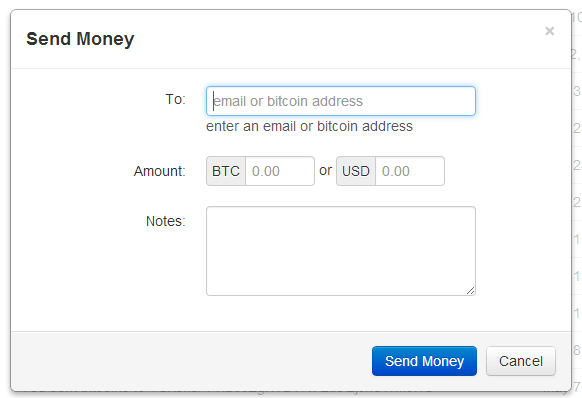
Coinbase is a web wallet with a simple design and a number of very useful features that make it excellent for beginners. You can send and receive bitcoins via email and buy and sell bitcoins directly from Coinbase.
Once you get the hang of things, it is better to move your coins off of Coinbase and into a wallet mentioned above like the Ledger Nano S . Coinbase is a good place to buy bitcoins and learn how it works, but not a good solution for long term storage.
A full-featured Android app enables access to all account functions on the go. Coinbase’s founders have a proven startup track record and have raised money from very prominent venture capitalists. This gives Coinbase a level of legitimacy unparalleled in the Bitcoin space. They are also one of the only large Bitcoin companies to never suffer a major hack. Click here to sign up.

Electrum is a software wallet that enables you to set up a strong level of security very quickly. During the simple installation process, you are given a twelve word phrase that will allow you to recover all of your bitcoins in the event that your computer fails. Your wallet is also encrypted by default which helps protect your coins against hackers. Electrum is available for Windows, OSX, and Linux and is our recommended software wallet for beginners. Click here to download the right version for your operating system.
Bitcoin Wallet for Android
For those looking for mobility and security, we recommend the simply-titled Bitcoin Wallet mobile app. There is a version for both Android and BlackBerry OS . It is a software wallet, so you retain complete control over your bitcoins. It also works well with QR codes and NFC, making transferring coins to someone else’s phone easier than writing a check. Be sure to backup your wallet (with the included “Backup Wallet” feature) or you risk losing all your coins the next time you get too close to a pool.
Other Wallets
We also recommend a few other wallets, but not for the beginning Bitcoin user. If you are up for more of a challenge, Armory is a good choice for those requiring the highest possible security, and the original Bitcoin-Qt client is also trusted and worth learning how to use.
Now that you have a wallet set up, it’s time to learn how to get some bitcoins .
Bitcoin Wallets Test: Die besten Bitcoin Wallets im Vergleich
Wir testen und vergleichen die besten Bitcoin-Wallets
Um Bitcoins zu senden, zu empfangen und zu sichern wird eine Bitcoin-Wallet benötigt. In der Bitcoin Wallet wird der Private Key (Private Schlüssel) gesichert, mit dem auf die eigenen Bitcoins zugegriffen werden kann. Das Angebot an Bitcoin-Wallets und die erweiterten Funktionen der Wallets sind mittlerweile riesig. Wir testen und vergleichen die besten Bitcoin Wallets.
Inhaltsverzeichnis
Die besten Bitcoin Wallets im Vergleich


- ✔ Akzeptiert PayPal


Unsere Empfehlung der Testsieger: Bitcoin Wallet Hardware: Ledger Nano S

Die Ledger Wallet ist eine hardwarebasierte Bitcoin Wallet. Hardware-Wallets gehören im Allgemeinen zu den sichersten Möglichkeiten die eigenen Bitcoins vor Hackerangriffen oder sonstigen unerwünschten Zugriffen zu schützen. Die Wallet ist eine sogenannte Cold-Wallet, erst wenn der Ledger Nano S per USB-Anschluss mit dem Computer verbunden wurde, ist ein Zugriff über das Internet möglich.
Die Ledger Wallet ist eine Hardware Wallet nicht nur für Bitcoin sondern auch für weitere Altcoins wie Ethereum, Dash, Ripple oder Litecoin. Dabei wird die Ledger Wallet aktuell in zwei verschiedenen Varianten angeboten: Die Ledger Blue für aktuell ca. 280 Euro und die Ledger Nano S für aktuell ca. 70 Euro.
Vorteile der Ledger Wallet
Durch einen Chip kryptographisch gesicherter Schlüssel
Bestätigung der Transaktion auf einem LED-Display
Unterstützung von Bitcoin, Ethereum und vielen Altcoin
Einfache Bedienung mit der Ledger-App bzw. der Ledger-Chrome-Erweiterung
Einfache Anbindung per USB-Anschluss
Kompatibel mit weiteren Wallets wie MyEtherWallet
Nachteile der Ledger Wallet
Die eigenen Interfaces für den Zugriff auf die Wallets sind nur mit dem Google Chrome-Browser kompatibel
Die Erweiterung auf weitere Altcoin-Wallets ist aufgrund des verfügbaren Speicherplatzes stark begrenzt
Für die Anschaffung fallen einmalig Kosten in Höhe von ca. 70 Euro für die Leger Nano S bzw. 280 Euro für die Ledger Blue an.
Aktuell hat Ledger aufgrund der extrem hohen Nachfrage eine Lieferzeit von mehreren Monaten
Unsere Empfehlung als Preis-Leistungs-Sieger: Coinbase-Wallet

Die Bitcoin Wallet Coinbase bietet eine extrem einfache und sichere Wallet für Bitcoin, Ethereum und Litecoin. Die intuitive Gestaltung, die hohen Sicherheitsstandards und einige nützliche Funktionen machen Coinbase zu einer der beliebtesten Online-Wallets weltweit.
Coinbase wurde 2012 in San Francisco gegründet und verzeichnet knapp 6 Millionen Benutzer mit über 12 Millionen Geldbörsen. Coinbase legt ebenfalls großen Wert auf Sicherheit. Neben einer SMS-Verifizierung bietet Coinbase ebenfalls eine 2-Faktor-Authentifizierung an. Somit ist das Konto vor ungewollten Zugriffen geschützt. Jedoch ist bei Coinbase zu beachten, dass die Wallet eine Hot-Wallet ist und somit nicht im Entferntesten an die Sicherheit einer hardwarebasierten Cold-Wallet herankommt.
Zudem bietet Coinbase auch die Möglichkeit zum Kauf von Bitcoins oder Ethereum über Kreditkarte oder Banküberweisung an. Beim Kauf per Kreditkarte werden die Bitcoins oder Ethereum sofort gutgeschrieben, es gelten jedoch höhere Limits und zusätzlich fällt eine Gebühr von 3,99% an. In unseren Tests per Kreditkarte hat alles reibungslos funktioniert und die Bitcoins oder das Ethereum waren sofort auf unserem Konto.
Vorteile der Coinbase-Wallet
Einsteigerfreundlich: Besonders für Bitcoin-Neulinge eine gute Wahl
Integrierte Kaufmöglichkeit von Bitcoin, Ethereum und Litecoin per Lastschrift oder Kreditkarte
Etablierte und vertrauenswürdige Firma aus San Francisco (USA)
Hohe Sicherheitsstandards mit beispielsweise 2-Faktor-Authentifizierung oder der Bitcoin-Tresor (Bitcoin Vault)
Extrem schnelle Überweisung zu angemessenen Transaktionsgebühren
Nachteile der Coinbase-Wallet
Die Kontrolle der eigenen Bitcoins wird an eine fremde Firma übergeben
Die Wallet ist eine Hot-Wallet und hat somit geringere Sicherheit wie eine hardwarebasierte Wallet
Bitcoin Konto: Wie funktionieren die Bitcoin Wallets?

Die Bitcoin Wallets sind zu vergleichen mit einem Geldbeutel in dem die eigenen Münzen, die Bitcoins, verwahrt werden bzw. mit einem Bankkonto. Um Bitcoins zu versenden hat die Wallet eine eigenen Zeichenfolge, den öffentlichen Schlüssel „Public Key“. Das bedeutet, dass die Bitcoins die an den Public Key gesendet werden an den Besitzer des zu dem Public Key dazugehörigen Private Key wechseln.
„Öffentliche Schlüssel (Public Key) = Wallet-Adresse, an die andere Bitcoins senden können.“
Und nun kommen wir zu dem zweiten, privaten Schüssel, dem „Private Key“. Dieser wird benötigt, um auf die Bitcoins zuzugreifen, die an den Public Key gesendet wurden. Somit ist derjenige, der den Private Key kennt auch der Besitzer der Bitcoins und kann diese wieder weiter ausgeben.
„Beim Senden von Bitcoins an einen Public Key übergebe ich das virtuelle Geld an denjenigen, der im Besitz des Private Key ist und somit der neue Besitzer der Bitcoins wird.“
Und genau diese Funktion übernimmen die Bitcoin Wallets. Diese enthält die Schlüssel, womit es möglich ist mit einer Wallet Bitcoins zu senden, zu empfangen und zu sichern. Grundsätzlich kann der Zugriff auf eine Bitcoin Wallet lediglich über den privaten Schlüssel erfolgen. Sobald dieser Zugangsschlüssel verloren geht, sind auch die darin aufbewahrten Bitcoins weg. Vergleichbar wäre dies mit dem Verlust der Geldbörse, welche Fiat-Geld (bspw. Euro oder US-Dollar) beinhaltet.
Worauf sollte man bei sicheren Bitcoin Wallets achten?
Hohe Sicherheit: Wie gut sind die Bitcoin geschützt. Handelt es sich um eine Hot- oder Cold-Wallet?
Backup & Sicherung: Wie kann man sich vor dem Verlust der Private Keys schützen und die Wallet wiederherstellen?
Privatsphäre: Schützt die Wallet die Privatsphäre bspw. durch Generierung von neuen Public Keys bei jedem Geldeingang?
Private Keys: Besteht die Möglichkeit auf die eigenen Private Keys zuzugreifen bzw. hat man diese unter eigener Kontrolle?
Einfachheit & Intuition: Wie einfach ist eine Wallet einzurichten und wie kann diese genutzt werden?
Weiterentwicklung der Wallet: Gibt es ein starkes Entwicklerteam bzw. eine solide Firma hinter der Wallet oder eine aktive Community, die die Wallet stetig weiterentwickelt und Sicherheitslücken direkt erkennt und behebt?
Kompatibilität: Ist die Wallet mit verschiedenen Betriebssystemen oder Devices (PC, Mac, Smartphone) kompatibel?
Sind Bitcoin Wallets anonym?
Grundsätzlich sind die Bitcoin Wallets anonym, was bedeutet, dass Bitcoin Wallets keine personalisierten Informationen wie Name oder Adresse des Besitzers speichern. Jedoch sind diese einer Person zugeordnet, nämlich der Person, die den Private Key der Wallet besitzt und damit die Kontrolle über die Bitcoins hat. Das bedeutet, dass Bitcoins häufig als pseudo-anonymes Zahlungsmittel angesehen wird. Denn die wahre Identität der Person ist nicht ersichtlich, jedoch kann jede Transaktion der Person über die Blockchain nachvollzogen werden. Die Bitcoin Adresse ist somit direkt mit einer Person verknüpft und wird als Pseudonym der Person verwendet.
„Jede Wallet ist anonym – es werden keine persönlichen Daten wie Name oder Adresse gespeichert.“
In der Blockchain wird jede Transaktion der Bitcoin Wallet festgehalten und ist auch für jeden ersichtlich. Somit kann von der ersten Überweisung bis hin zur letzten Transaktion alles in der Blockchain nachvollzogen werden.
Wann sind die Bitcoin Wallets nicht mehr anonym? Es gibt verschiedene Wege, wie die Anonymität der Bitcoin Wallets nicht mehr gegeben ist. Einige könnten sein:
- Eine Bitcoin-Wallet Adresse wird mit Namen veröffentlicht: „Spende bitte an meine Adresse: 123“
- Mit den Bitcoins wird eingekauft und die Empfängeradresse angegeben
- FIAT-Geld („Euro“, „US-Dollar“) werden gegen Bitcoins eingetauscht. Hier muss meist aufgrund verschiedener Geldwäsche-Gesetze die Identität angegeben werden
„Wenn jemand Ihre Wallet kennt, kann er auch einsehen, wie viel Guthaben Sie auf dieser haben.“
Häufig wird für jede eingehende Transaktion eine neue Adresse verwendet, so dass das Guthaben der eigenen Wallet nicht eingesehen werden kann. Obwohl das Guthaben jeder Wallet eingesehen werden kann, kann nur mit dem Private Key darauf zugegriffen werden.
Wie erstelle ich eine Bitcoin Wallet?
Das Erstellen einer Bitcoin Wallet ist mittlerweile sehr einfach und es gibt unzählige Anbieter für Bitcoin Wallets. Das Schwierigste ist, den Verwendungszweck der Wallet und den entsprechenden Anbieter auszuwählen.
Bitcoin Wallets erstellen
In wenigen Schritten zeigen wir, wie Bitcoin Wallets online eingerichtet werden kann und auch erste Bitcoins gegen Euro gekauft werden können:
Aktuell existieren fünf unterschiedliche Wallet Kategorien:
- Desktop-Wallet
- Mobile-Wallet
- Online- oder Web-Wallet
- Paper-Wallet
- Hardware-Wallet
Jede Kategorie hat bestimmte Vor- und Nachteile. Nehmen wir als Beispiel die Paper-Wallet. Eine eigene Bitcoin-Paper Wallet kann sich jeder in einer Minute erstellen (bspw. https://www.bitaddress.org/).

Diese hat den großen Vorteil, dass der Private Key ausgedruckt werden kann und der Zugriff durch Hacker somit beinahe unmöglich ist. Doch bringt die Paper Wallet natürlich auch Nachteile mit sich. Denn um auf die eigene Wallet zuzugreifen, um beispielsweise Bitcoins zu transferieren, muss jedes Mal der Public und Private Key eingegeben werden. Somit ist die Bitcoin-Paper-Wallet beispielsweise nicht als tägliches Girokonto geeignet, um mehrere Überweisungen zu tätigen – um Bitcoins auf längere Sicht zu sparen kann schon eher ein sinnvoller Anwendungszweck der Paper-Wallet sein.
Die Bitcoin Hardware-Wallet einrichten: Ledger Nano S

Die Ledger-Wallet* ist eine hardwarebasierte Bitcoin-, Ethereum- & Altcoin-Wallet. Hardware-Wallets gehören im Allgemeinen zu den sichersten Möglichkeiten die das eigene Ether vor Hackerangriffen oder sonstigen unerwünschten Zugriffen zu schützen. Die Wallet ist eine sogenannte Cold-Wallet, erst wenn der Ledger Nano S-Stick per USB-Anschluss mit dem Computer verbunden wurde, ist ein Zugriff über das Internet möglich.
Die Bitcoin Wallet ist in wenigen Schritten eingerichtet
Nachdem der Leder Nano S-Stick mit dem Computer per USB-Kabel verbunden wurde, wird man mit einer „Welcome“-Meldung begrüßt. Nach der kurzen Begrüßung kann der Ledger Nano S-Stick konfiguriert werden. Indem beide Tasten kurz gleichzeitig gedrückt werden kann mit der Konfiguration gestartet werden. Das kurze gleichzeitige drücken beider Tasten ist immer die Bestätigung einer Aktion.
Kurz beide Knöpfe gleichzeitig drücken = Bestätigung einer Aktion
Linken Knopf drücken = nach oben / nach links
Rechten Knopf drücken = nach unten / nach rechts
1. Schritt: Start der Konfiguration
Mit der Auswahl „Configure as new device?“ wird mit dem rechten Knopf die Konfiguration als neue Hardware-Wallet begonnen. Im Falle eines Verlustes oder einer Beschädigung eines alten Ledger-Sticks kann auch ein bereits erstellter Wiederherstellungs-Seed (Revovery Seed) einer anderen Wallet angegeben werden. Damit kann auf eine bereits vorhandene Wallet zugegriffen werden.
2. Schritt: Pin-Code vergeben

Damit die Ledger-Hardware-Wallet auch im Falle eines Verlustes vor unbefugtem Zugriff geschützt ist, wird ein Code vergeben. Dieser kann wahlweise zwischen 4-8 Stellen lang sein. Mit dem rechten oder linken Knopf wird dabei die Zahl ausgewählt. Hat man sich für eine Zahl entschieden wird diese mit dem drücken beider Knöpfe gleichzeitig eingerastet. Nach vier Stellen kann der Code im Ganzen bestätigt werden.
Unsere Empfehlung: Wird die Wallet sicher zu Hause gelagert, ist meist ein Code mit vier Stellen ausreichend – besonders wenn die Wallet häufiger genutzt wird, kann es auch lästig werden einen längeren Code einzugeben. Wer jedoch seine Hardware-Wallet mit auf Reisen mitnimmt oder dauerhaft bei sich trägt, der sollte zu einem sicheren längeren Code greifen.
Den Pin sollte man sich auf jeden Fall merken, da dieser bei jedem Start der Hardware-Wallet abgefragt wird!
3. Schritt: Backup mit Wiederherstellungs-Seed sichern
Falls die Ledger-Wallet einmal verloren geht oder defekt ist, ist die Wallet mit den darauf gesicherten Coins nicht verloren. Denn mit dem Recovery-Seed kann die Wallet wieder hergestellt werden. Dabei kann mit Hilfe des Seeds auf einer beliebigen anderen Ledger-Wallet, aber auch auf anderen Software- oder Online-Wallets die Private Keys, für den Zugriff auf die Wallet, wieder hergestellt werden. Dafür müssen 24 kurze Wörter auf das mitgelieferte Recovery-Seed-Blatt geschrieben werden.
Achtung: Der Revovery-Seed ist extrem wichtig und sensibel: Hiermit kann die Wallet wiederhergestellt werden – aber auch Unbefugte, die den Recovery-Seed besitzen, können damit den Private Key wiederherstellen und so Zugriff auf die Wallet erlangen. Deswegen sollte der Seed unbedingt sicher aufbewahrt werden!
Nachdem die 24 Wörter abgeschrieben wurden, werden von dem Stick sicherheitshalber nochmal zwei Wörter abgefragt. Wurden diese richtig eingegeben, so ist der Stick fertig konfiguriert und kann verwendet werden.
4. Schritt: Bitcoin Chrome App installieren
Herzlichen Glückwunsch! Dein Stick ist nun fertig eingerichtet. Nun kannst du die dazugehörigen Interfaces für den PC installieren, um auf die Wallets zuzugreifen, Coins zu empfangen und zu senden.

Dabei sind diese Wallet-Interfaces kleine Apps, die zusammen mit dem Chrome-Browser funktionieren. Diese können hier für verschiedene Wahrungen heruntergeladen werden: https://www.ledgerwallet.com/apps

Nach dem Starten der App kann der Ledger-Stick angeschaltet und die entsprechende Wallet ausgewählt werden. Dabei sind von Anfang an zwei Standard-Wallets für Bitcoin und Ethereum vorinstalliert – auf dem Stick können per Update noch weitere Wallets nachinstalliert werden.

Nach dem Öffnen der Bitcoin Wallet auf dem Ledger-Stick steht die Chrome-App vollständig zur Verfügung und es können Bitcoin empfangen und gesendet werden.
Best Bitcoin Wallet
Bitcoin has been one of the most lucrative investments of the 21st century, so it’s no surprise that you might find yourself wanting to purchase some. But before you jump the gun, you should know exactly how to store Bitcoin and other cryptocurrencies — you wouldn’t want to risk losing your hard-earned cash.
Truth be told, storing Bitcoin isn’t at all difficult. The key is storing it in a safe, yet accessible place, and knowing how you should store for different purposes. Without further ado, here’s our guide to storing Bitcoin.
How do I store Bitcoin?
Although it may sound daunting at first, Bitcoin isn’t at all difficult to store. That’s because holding Bitcoin is really just having access to a password — a private key — which lets you transact with the coins on the public network.
That’s right: storing Bitcoin is as simple as storing a bunch of numbers and letters. This gives you a fair number of options when it comes to the different ways and places you can hold it.
In general, the places you hold your private keys are referred to as wallets. Some wallets can also be used to send Bitcoin (like software ones), while others can only be used to store and receive Bitcoin (like paper ones).
Before we discuss the ways in which you can hold Bitcoin, let’s talk a little more about private keys.
Private keys
Private keys are the alphanumeric passcodes which give you access to your cryptocurrencies, like Bitcoin. They’re extremely important, because the only way that you can send a chunk of cryptocurrency is by ‘signing’ the transaction with your secretly-kept private key. No keys means no coins.
Most private keys are 64 characters long, with the characters ranging from 0 to 9 and A to F. Remembering this long passcode is nowhere near as easy as remembering your 4 digit bank pin or your 16 digit credit card number, not to mention the extra 6 characters which can be included (A-F). This is why Bitcoin users choose write down their keys either digitally or physically.
When we talk about the different ways to store Bitcoin, we’re really just talking about the most secure and accessible places — wallets — to write down our private keys. Let’s take a look at them now.
Where can I store Bitcoin?
There are four popular places to store cryptocurrencies: online, on your computer (software), on a physical device (hardware), or on a piece of paper. Discussing these one-by-one, you’ll see how easy it can be to over-complicate things.
Online bitcoin wallets
Online wallets are the most frequently used Bitcoin storage systems. With an online wallet, like the immensely popular Coinbase, a third party takes care of storing your private keys. As long as they are trustworthy service, this means that you can send, store, and receive Bitcoin without ever having to touch a private key.
The benefits of using an online wallet are:
- Quick and easy setup
- No technical knowledge required
- Accessible from anywhere
- Buying, storing, and selling on one service
The disadvantages are:
- Limited ownership of your private keys
- Risk of losing access to your coins
- Transaction fees
Best online bitcoin wallets
Bitcoin software wallets
Software wallets are another lightweight, easy solution to storing Bitcoin. These wallets store private keys on your computer’s hard drive as secretly and as safely as possible. Software wallets also offer the functionality to automatically transact with your Bitcoin, doing the hard part of the work for you.
The benefits of using a software wallet are:
Little technical knowledge required
Complete ownership of your private keys
Easy to send and receive
The disadvantages are:
Significant setup time
Needing access to the same computer
Risk of being hacked
Best online bitcoin software wallets
Bitcoin hardware wallets
Hardware wallets are dedicated devices which store your Bitcoin on a portable, failproof computer. That’s right, they’re boxed-up computers which create, encrypt, and isolate your private keys, preventing them from ever getting out. What’s more, they can be secured with a pin and backed-up with long passphrases, in case anything does happen to the device itself. Although this may sound excessive, it certainly makes hardware wallets a secure way to store your coins.
The benefits of using a hardware wallet are:
- Extreme security
- Relatively portable
- Complete ownership of your private keys
- Built-in transaction functions
The disadvantages are:
- Physical device
- Significant one-time cost ($50+)
- Some technical knowledge required
Best hardware wallets for storing bitcoin
Paper bitcoin wallets
Our last way of storing Bitcoin is as safe as it is cost effective: the paper wallet. Paper wallets are computer printouts with your private keys written down. While they might be a little problematic to take care of, there’s certainly no risk of your printed paper being hacked.
The benefits of using a paper wallet are:
- Flawless digital security
Relatively portable
Complete ownership of your private keys
The disadvantages are:
- Risk of natural damage (fire, water, etc)
- Keys kept in plain sight
- Time-taking to setup and transact with
- Some technical knowledge required
Best Bitcoin Paper Wallets
Note: For the most part, you don’t “buy” paper wallets. As a result, the above services will just create a print out for a generic paper wallet, or generate an address and private key for your custom paper wallet.
What’s the best way to store Bitcoin?
With four surprisingly unique ways to do so, you might be wondering how best to store your Bitcoins. The thing is, that’s not such an easy question to answer.
Why? Because the ‘word’ best is a little ambiguous: who knows whether you’re looking for added security or extra accessibility, and whether you’re looking to store pennies or your marriage’s retirement fund.
With that in mind, we’ll start by discussing the definitively easiest way to store Bitcoin, then the definitively safest way to store Bitcoin, and finally the best way to store Bitcoin under your particular circumstances.
The easiest way to store Bitcoin
Without a doubt, the easiest way to store Bitcoin is using an online wallet. You need absolutely no technical knowledge; you can buy, sell, and hold in the same place; and there’s no lengthy setup or physical limitations.
It’s all for a big sacrifice though: having no access to your private keys. This means that in a certain sense you don’t own your cryptocurrencies at all, and you’ve got to hope that the service provider is willing to cooperate when it comes to withdrawing or spending your coins.
The safest way to store Bitcoin
The safest way to store Bitcoin would have to be with a hardware wallet. The security offered by a standalone, single-purpose device has no match. There’s almost no risk of your cryptocurrencies being hacked, and it’s not like someone can steal everything with just the device (as with a paper wallet), thanks to the clever PIN systems.
The sacrifice of storing in a hardware wallet comes as a loss of usability and accessibility, along with a significant price tag. You’ll obviously need to carry your hardware wallet around with you when you want to spend, and you’ll need some technical knowledge to setup and use it effectively.
A comparison: The best way to store Bitcoin
Now let’s try to answer the more complicated question: what’s the best way to store Bitcoin? To make a meaningful conclusion, you’ll need to identify what features and characteristics you need most, and what you’re willing to sacrifice instead.
Then, you’ll need to understand the different selling points and limitations that certain storage methods offer. To help you out with this, we’ve compiled a table comparing the four wallets we mentioned above:
Bitcoin Wallets

A Bitcoin wallet is a digital wallet to store your Bitcoin.
Every Bitcoin wallet has both a public key and a private key. The public key is kind of like your street address, it is a 30+ digit combination of numbers and characters that you would use to receive Bitcoin.

The private key is what your wallet uses to unlock the Bitcoin you have. Without it, you would not have access to the Bitcoin within the wallet. The private key is not something you have to type or input. The wallet that you use will automatically use your private key when needing to send out Bitcoins.
There are many kinds of Bitcoin wallets and depending on your preference and comfort level with security, you’ll have a few to choose from.
BITCOIN WALLET – HARDWARE BASED – THE BEST
Hardware Bitcoin wallets are secure and offline USB devices. They are considered cold storage because you can unplug them from your computer and store them anywhere including bank vaults. However, hardware wallets have hot wallet functionality once you plug them in. They are the best of both worlds.
Hardware wallets are immune to malware and nearly impossible to hack. The screens also provide extra security by verifying and displaying important wallet details. Since the hardware wallet is nearly impossible to hack, its screen is more trustworthy than data displayed on your computer.

Ledger Nano S is one of the first to market and simply the best hardware wallet out there. It has a sleek design, intuitive user interface, a wide support of coins including Bitcoin. A Ledger Nano S is considered the best Bitcoin Wallet on the market. The downside is you do have to buy it.
You can buy a Ledger directly from the manufacturer here or you can buy them on Amazon with faster delivery service.
BITCOIN WALLET – DESKTOP BASED – THE EASIEST
Exodus is desktop Ethereum wallet with a beautiful design and an intuitive interface. Exodus stores the private key on your machine and not on an external server. This means you have full control (and full responsibility) for your coins.
Exodus requires a password to be entered for access and provide both an email back/restore and a passphrase back/restore. The only thing to watch out for is it does not have MFA/2fA feature so once the wallet is up, it stays up until closed.
Exodus partnered with Shapeshift and allows you to exchange Bitcoin for other Cryptocurrency without every leaving the wallet. Desktop Bitcoin wallet is the easiest to manage from a PC and the capability of trading coins without leaving your wallet is a huge plus.

BITCOIN WALLET – EXCHANGE BASED – THE FASTEST
Exchange Bitcoin wallet is what you would get with any exchange that buys, sells, trades Bitcoin. By default, they are pretty good and as long as you secure account access with MFA/2FA you are secure from hacks.
An exchange Bitcoin wallet is considered the fastest because as soon as you buy Bitcoin (in this example with Coinbase) you already have a wallet setup for you. No need to transfer or do anything else. I suggest Coinbase since they are FDIC insured and all accounts are protected up to $250,000 dollars.

BITCOIN WALLET – WEBSITE BASED – FREE
A website Bitcoin wallet with high praise is from StrongCoin. The wallet provider not only offer 2FA/MFA but they also encrypt your personal passphrase so that they don’t even have the ability to unlock your wallet even if they wanted to. They support Bitcoin and offer people the unique opportunity to create a paper wallet for their Bitcoin if they wanted to.

BITCOIN WALLET – PAPER BASED – OFF NET
A paper wallet is when you literally print out on a sheet of paper, the public and private keys to your Bitcoin reserves. Often it will have QR codes, so that you can quickly scan them and add the keys into a software wallet to make a transaction.
The benefit of a paper wallet is that the keys are not stored digitally anywhere, and are therefore not subject to cyber-attacks or hardware failures. The disadvantage of a paper wallet is that paper and ink can degrade, and paper is relatively fragile – it’s definitely worth keeping well away from fire and water for obvious reasons.
I mentioned StrongCoin having this type of functionality.
TO RECAP THE BITCOIN WALLETS
As you can see, you have some good choices with Bitcoin Wallets. Your preference and comfort level will determine which one is right for you. The hardware Bitcoin wallet is definitely the best and most secure. The desktop Bitcoin wallet is the easiest to use on daily bases. The exchange Bitcoin wallet is the fastest to setup and use. The website Bitcoin wallet is free and lastly the paper Bitcoin wallet makes it you can store your Bitcoin completely off net.
US Search Mobile Web

Welcome to the Yahoo Search forum! We’d love to hear your ideas on how to improve Yahoo Search.
The Yahoo product feedback forum now requires a valid Yahoo ID and password to participate.
You are now required to sign-in using your Yahoo email account in order to provide us with feedback and to submit votes and comments to existing ideas. If you do not have a Yahoo ID or the password to your Yahoo ID, please sign-up for a new account.
If you have a valid Yahoo ID and password, follow these steps if you would like to remove your posts, comments, votes, and/or profile from the Yahoo product feedback forum.
- Vote for an existing idea ( )
- or
- Post a new idea…
- Hot ideas
- Top ideas
- New ideas
- Category
- Status
- My feedback
Improve your services
Your search engine does not find any satisfactory results for searches. It is too weak. Also, the server of bing is often off
I created a yahoo/email account long ago but I lost access to it; can y'all delete all my yahoo/yahoo account except for my newest YaAccount
I want all my lost access yahoo account 'delete'; Requesting supporter for these old account deletion; 'except' my Newest yahoo account this Account don't delete! Because I don't want it interfering my online 'gamble' /games/business/data/ Activity , because the computer/security program might 'scure' my Information and detect theres other account; then secure online activities/ business securing from my suspicion because of my other account existing will make the security program be 'Suspicious' until I'm 'secure'; and if I'm gambling online 'Depositing' then I need those account 'delete' because the insecurity 'Suspicioun' will program the casino game 'Programs' securities' to be 'secure' then it'll be 'unfair' gaming and I'll lose because of the insecurity can be a 'Excuse'. Hope y'all understand my explanation!
I want all my lost access yahoo account 'delete'; Requesting supporter for these old account deletion; 'except' my Newest yahoo account this Account don't delete! Because I don't want it interfering my online 'gamble' /games/business/data/ Activity , because the computer/security program might 'scure' my Information and detect theres other account; then secure online activities/ business securing from my suspicion because of my other account existing will make the security program be 'Suspicious' until I'm 'secure'; and if I'm gambling online 'Depositing' then I need those account 'delete' because the insecurity 'Suspicioun' will program the casino game 'Programs' securities' to be… more
chithidio@Yahoo.com
i dont know what happened but i can not search anything.
Golf handicap tracker, why can't I get to it?
Why do I get redirected on pc and mobile device?
Rahyaftco@yahoo.com
RYAN RAHSAD BELL literally means
Question on a link
In the search for Anaïs Nin, one of the first few links shows a picture of a man. Why? Since Nin is a woman, I can’t figure out why. Can you show some reason for this? Who is he? If you click on the picture a group of pictures of Nin and no mention of that man. Is it an error?
Repair the Yahoo Search App.
Yahoo Search App from the Google Play Store on my Samsung Galaxy S8+ phone stopped working on May 18, 2018.
I went to the Yahoo Troubleshooting page but the article that said to do a certain 8 steps to fix the problem with Yahoo Services not working and how to fix the problem. Of course they didn't work.
I contacted Samsung thru their Samsung Tutor app on my phone. I gave their Technican access to my phone to see if there was a problem with my phone that stopped the Yahoo Search App from working. He went to Yahoo and I signed in so he could try to fix the Yahoo Search App not working. He also used another phone, installed the app from the Google Play Store to see if the app would do any kind of search thru the app. The Yahoo Search App just wasn't working.
I also had At&t try to help me because I have UVERSE for my internet service. My internet was working perfectly. Their Technical Support team member checked the Yahoo Search App and it wouldn't work for him either.
We can go to www.yahoo.com and search for any topic or website. It's just the Yahoo Search App that won't allow anyone to do web searches at all.
I let Google know that the Yahoo Search App installed from their Google Play Store had completely stopped working on May 18, 2018.
I told them that Yahoo has made sure that their Yahoo members can't contact them about anything.
I noticed that right after I accepted the agreement that said Oath had joined with Verizon I started having the problem with the Yahoo Search App.
No matter what I search for or website thru the Yahoo Search App it says the following after I searched for
www.att.com.
WEBPAGE NOT AVAILABLE
This webpage at gttp://r.search.yahoo.com/_ylt=A0geJGq8BbkrgALEMMITE5jylu=X3oDMTEzcTjdWsyBGNvbG8DYmyxBHBvcwMxBHZ0aWQDTkFQUEMwxzEEc2VjA3NylRo=10/Ru=https%3a%2f%2fwww.att.att.com%2f/Rk=2/Es=plkGNRAB61_XKqFjTEN7J8cXA-
could not be loaded because:
net::ERR_CLEARTEXT_NOT_PERMITTED
I tried to search for things like www.homedepot.com. The same thing happened. It would say WEBPAGE NOT AVAILABLE. The only thing that changed were all the upper and lower case letters, numbers and symbols.
Then it would again say
could not be loaded because:
net::ERR_CLEARTEXT_NOT_PERMITTED
This is the same thing that happened when Samsung and At&t tried to do any kind of searches thru the Yahoo Search App.
Yahoo needs to fix the problem with their app.
Yahoo Search App from the Google Play Store on my Samsung Galaxy S8+ phone stopped working on May 18, 2018.
I went to the Yahoo Troubleshooting page but the article that said to do a certain 8 steps to fix the problem with Yahoo Services not working and how to fix the problem. Of course they didn't work.
I contacted Samsung thru their Samsung Tutor app on my phone. I gave their Technican access to my phone to see if there was a problem with my phone that stopped the Yahoo Search App from working. He went to Yahoo and… more
11 447 пользователей находятся здесь
МОДЕРАТОРЫ








Welcome to Reddit,
the front page of the internet.
and subscribe to one of thousands of communities.
отправлено 1 год назад , изменено * автор SerenityTrading
Want to add to the discussion?
[–]bitofit 3 очка 4 очка 5 очков 1 год назад (2 дочерних комментария)
[–]ramijakut redditor for 2 weeks 0 очков 1 очко 2 очка 9 месяцев назад * (0 дочерних комментарев)
[–]puddletownLou 2 очка 3 очка 4 очка 10 месяцев назад (0 дочерних комментарев)
[–]wothy 6 очков 7 очков 8 очков 1 год назад (1 дочерний комментарий)
[–]zazomazzo 0 очков 1 очко 2 очка 1 год назад (0 дочерних комментарев)
[–]cobranix 0 очков 1 очко 2 очка 11 месяцев назад (1 дочерний комментарий)
[–]qda 5 очков 6 очков 7 очков 10 месяцев назад (0 дочерних комментарев)
[–]purpleyak0 8 очков 9 очков 10 очков 1 год назад (2 дочерних комментария)
[–]Candsno8 2 очка 3 очка 4 очка 1 год назад (0 дочерних комментарев)
[–]jsrob 2 очка 3 очка 4 очка 1 год назад (0 дочерних комментарев)
[–]homerq 2 очка 3 очка 4 очка 1 год назад (0 дочерних комментарев)
[–]vvv7777777 redditor for 2 months 7 очков 8 очков 9 очков 1 год назад * (3 дочерних комментария)
[–]Spartra 0 очков 1 очко 2 очка 1 год назад (2 дочерних комментария)
[–]slomar 2 очка 3 очка 4 очка 1 год назад (1 дочерний комментарий)
[–]Spartra 2 очка 3 очка 4 очка 1 год назад (0 дочерних комментарев)
[–]revcback 5 очков 6 очков 7 очков 1 год назад (9 дочерних комментарев)
[–]zazomazzo 7 очков 8 очков 9 очков 1 год назад (1 дочерний комментарий)
[–]irascible 5 очков 6 очков 7 очков 10 месяцев назад (0 дочерних комментарев)
[–]REDROO265 6 очков 7 очков 8 очков 1 год назад (1 дочерний комментарий)
[–]qda 6 очков 7 очков 8 очков 10 месяцев назад (0 дочерних комментарев)
[–]Z0ey 4 очка 5 очков 6 очков 1 год назад (4 дочерних комментария)
[–]ichabodsc 4 очка 5 очков 6 очков 1 год назад (0 дочерних комментарев)
[–]qda 2 очка 3 очка 4 очка 10 месяцев назад (0 дочерних комментарев)
[–]jzcjca00 0 очков 1 очко 2 очка 1 год назад (0 дочерних комментарев)
[–]mataleo 1 очко 2 очка 3 очка 12 месяцев назад (0 дочерних комментарев)
[–]animateash 1 очко 2 очка 3 очка 10 месяцев назад (1 дочерний комментарий)
[–]bbski13 1 очко 2 очка 3 очка 10 месяцев назад (0 дочерних комментарев)
[–]johnwan123 1 очко 2 очка 3 очка 9 месяцев назад (0 дочерних комментарев)
[–]itsinfo 1 очко 2 очка 3 очка 1 год назад (0 дочерних комментарев)
[–]OutCast3k 0 очков 1 очко 2 очка 1 год назад (0 дочерних комментарев)
[–]indabaa 0 очков 1 очко 2 очка 12 месяцев назад (0 дочерних комментарев)
[–]Yukkasim redditor for 3 months 0 очков 1 очко 2 очка 11 месяцев назад (0 дочерних комментарев)
[–]Av8Surf 0 очков 1 очко 2 очка 11 месяцев назад (0 дочерних комментарев)
[–]HaoBTC 0 очков 1 очко 2 очка 10 месяцев назад (0 дочерних комментарев)
[–]bstappp 0 очков 1 очко 2 очка 10 месяцев назад (0 дочерних комментарев)
[–]TheSyray 0 очков 1 очко 2 очка 10 месяцев назад (0 дочерних комментарев)
[–]-Zarkov- 0 очков 1 очко 2 очка 9 месяцев назад (0 дочерних комментарев)
[–]Shubh_srd 0 очков 1 очко 2 очка 9 месяцев назад (0 дочерних комментарев)
[–]jamique -2 очков -1 очков 0 очков 1 год назад (0 дочерних комментарев)
- приложенияи инструменты
- Reddit for iPhone
- Reddit for Android
- mobile website
- кнопки
Использование данного сайта означает, что вы принимаете пользовательского соглашения и Политика конфиденциальности. © 2018 reddit инкорпорейтед. Все права защищены.
REDDIT and the ALIEN Logo are registered trademarks of reddit inc.
![]()
π Rendered by PID 109934 on app-170 at 2018-05-29 19:29:20.590304+00:00 running 7e980a7 country code: RU.
Bitcoin Wallets

A Bitcoin wallet is a digital wallet to store your Bitcoin.
Every Bitcoin wallet has both a public key and a private key. The public key is kind of like your street address, it is a 30+ digit combination of numbers and characters that you would use to receive Bitcoin.

The private key is what your wallet uses to unlock the Bitcoin you have. Without it, you would not have access to the Bitcoin within the wallet. The private key is not something you have to type or input. The wallet that you use will automatically use your private key when needing to send out Bitcoins.
There are many kinds of Bitcoin wallets and depending on your preference and comfort level with security, you’ll have a few to choose from.
BITCOIN WALLET – HARDWARE BASED – THE BEST
Hardware Bitcoin wallets are secure and offline USB devices. They are considered cold storage because you can unplug them from your computer and store them anywhere including bank vaults. However, hardware wallets have hot wallet functionality once you plug them in. They are the best of both worlds.
Hardware wallets are immune to malware and nearly impossible to hack. The screens also provide extra security by verifying and displaying important wallet details. Since the hardware wallet is nearly impossible to hack, its screen is more trustworthy than data displayed on your computer.

Ledger Nano S is one of the first to market and simply the best hardware wallet out there. It has a sleek design, intuitive user interface, a wide support of coins including Bitcoin. A Ledger Nano S is considered the best Bitcoin Wallet on the market. The downside is you do have to buy it.
You can buy a Ledger directly from the manufacturer here or you can buy them on Amazon with faster delivery service.
BITCOIN WALLET – DESKTOP BASED – THE EASIEST
Exodus is desktop Ethereum wallet with a beautiful design and an intuitive interface. Exodus stores the private key on your machine and not on an external server. This means you have full control (and full responsibility) for your coins.
Exodus requires a password to be entered for access and provide both an email back/restore and a passphrase back/restore. The only thing to watch out for is it does not have MFA/2fA feature so once the wallet is up, it stays up until closed.
Exodus partnered with Shapeshift and allows you to exchange Bitcoin for other Cryptocurrency without every leaving the wallet. Desktop Bitcoin wallet is the easiest to manage from a PC and the capability of trading coins without leaving your wallet is a huge plus.

BITCOIN WALLET – EXCHANGE BASED – THE FASTEST
Exchange Bitcoin wallet is what you would get with any exchange that buys, sells, trades Bitcoin. By default, they are pretty good and as long as you secure account access with MFA/2FA you are secure from hacks.
An exchange Bitcoin wallet is considered the fastest because as soon as you buy Bitcoin (in this example with Coinbase) you already have a wallet setup for you. No need to transfer or do anything else. I suggest Coinbase since they are FDIC insured and all accounts are protected up to $250,000 dollars.

BITCOIN WALLET – WEBSITE BASED – FREE
A website Bitcoin wallet with high praise is from StrongCoin. The wallet provider not only offer 2FA/MFA but they also encrypt your personal passphrase so that they don’t even have the ability to unlock your wallet even if they wanted to. They support Bitcoin and offer people the unique opportunity to create a paper wallet for their Bitcoin if they wanted to.

BITCOIN WALLET – PAPER BASED – OFF NET
A paper wallet is when you literally print out on a sheet of paper, the public and private keys to your Bitcoin reserves. Often it will have QR codes, so that you can quickly scan them and add the keys into a software wallet to make a transaction.
The benefit of a paper wallet is that the keys are not stored digitally anywhere, and are therefore not subject to cyber-attacks or hardware failures. The disadvantage of a paper wallet is that paper and ink can degrade, and paper is relatively fragile – it’s definitely worth keeping well away from fire and water for obvious reasons.
I mentioned StrongCoin having this type of functionality.
TO RECAP THE BITCOIN WALLETS
As you can see, you have some good choices with Bitcoin Wallets. Your preference and comfort level will determine which one is right for you. The hardware Bitcoin wallet is definitely the best and most secure. The desktop Bitcoin wallet is the easiest to use on daily bases. The exchange Bitcoin wallet is the fastest to setup and use. The website Bitcoin wallet is free and lastly the paper Bitcoin wallet makes it you can store your Bitcoin completely off net.
Best Ethereum Wallet (2018 Update) – 5 Options Reviewed
Last updated on February 26th, 2018 at 04:29 pm
Ethereum, the blockchain platform that allows smart contracts, is becoming more and more popular. Since the beginning of 2017 the price has spiked from $8.22 to around $50. I’ve covered how to buy Ethereum in a previous post but that’s only part of the process. Today I want to cover 5 different types of Ethereum wallets so you will know where to store your Ethereum.
Ethereum is a very technical currency (even more than Bitcoin), therefore most wallets out there aren’t newbie friendly. I will go over them from the simplest to the most complex so you can choose the one that is best suited to your knowledge level.
Hardware wallets – Best security (for a price)
If you’re serious about securing your altcoins I suggest storing your Ethereum on a hardware wallet. However these hardware wallets aren’t free and cost anywhere between $50-$100 (shipping not included). Today’s leading hardware wallets TREZOR, Ledger and KeepKey all supply you with the option to store Ethereum on them. Instead of explaining about each one I’ll just link to my previous reviews on the wallets:
Personally, I use a TREZOR but all three are excellent choices for maximum security.
Coinbase’s Ethereum wallet – The simplest option
Coinbase supplies an Ethereum wallet as well as a Bitcoin wallet. Coinbase’s wallet is simple to set up and very easy to use, however it has a few limitations you’ll need to be aware of:
- The company holds the private key of the wallet for you. This means you’re not in control of your funds and Coinbase can decide to shut down your account if they want to. There were cases in the past that Coinbase shut down user accounts do to illegal activity.
- The Coinbase ETH wallet doesn’t support ETC (Ethereum Classic). For a simple explanation about ETC vs ETH read this post.
Once you open a Coinbase account you’ll immediately see an ETH wallet appearing under the “accounts” tab.
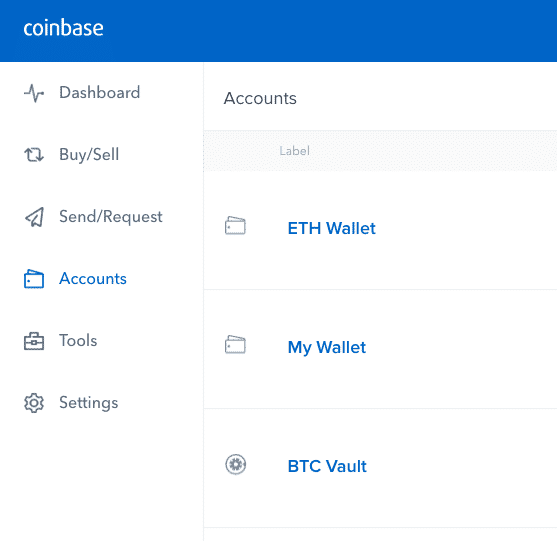
You can then enter your ETH account and click on “wallet address” in order to get your Ethereum public address.
Click here to check out Coinabase’s ethereum wallet.
Exodus wallet – The desktop option for increased control
Exodus is a Bitcoin and Altcoin desktop wallet with beautiful design and an intuitive interface. I’ve reviewed the wallet in the past and thought it was one of the best I’ve found so far. When it comes to limitations for exodus keep in mind that it’s not 100% open source. Many components inside Exodus are open source, but not all of them. This means that the code doesn’t get reviewed in full by the community.
Also the wallet is currently available only in a desktop version (no mobile version yet). Like Coinbase, Exodus does not support ETC only ETH. However, unlike Coinbase, Exodus is an independent wallet that stores the private key on your machine and not on any external sever. This means you have full control (and full responsibility) for your coins.
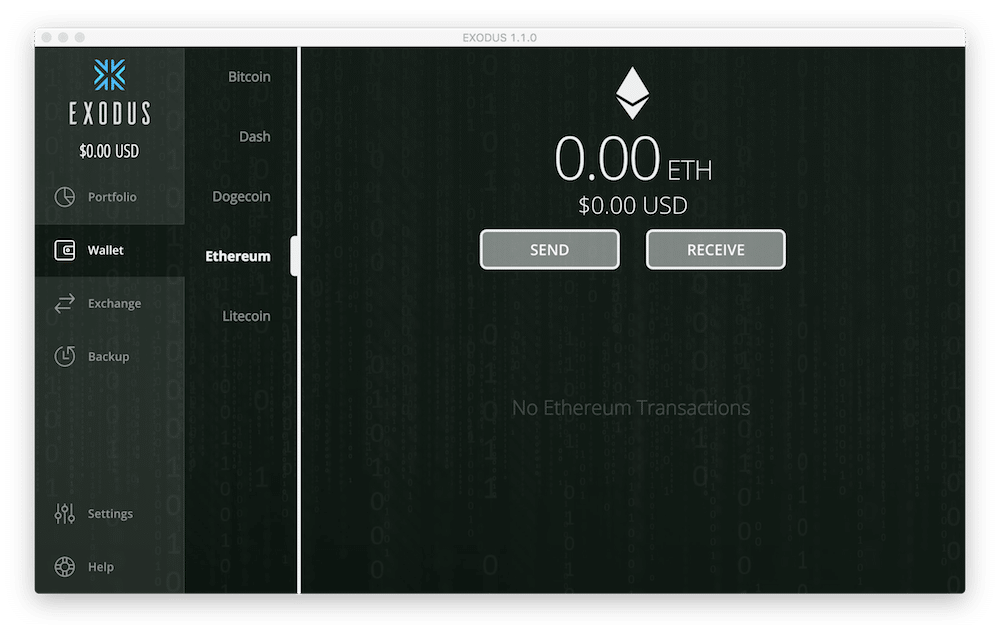
Exodus allows you to accept Bitcoin, Ethereum, Dash, Dogecoin and Litecoin. Just go to “Wallet” and choose the cryptocurrency you want. Afterward click on “Receive” to view your Ethereum address.
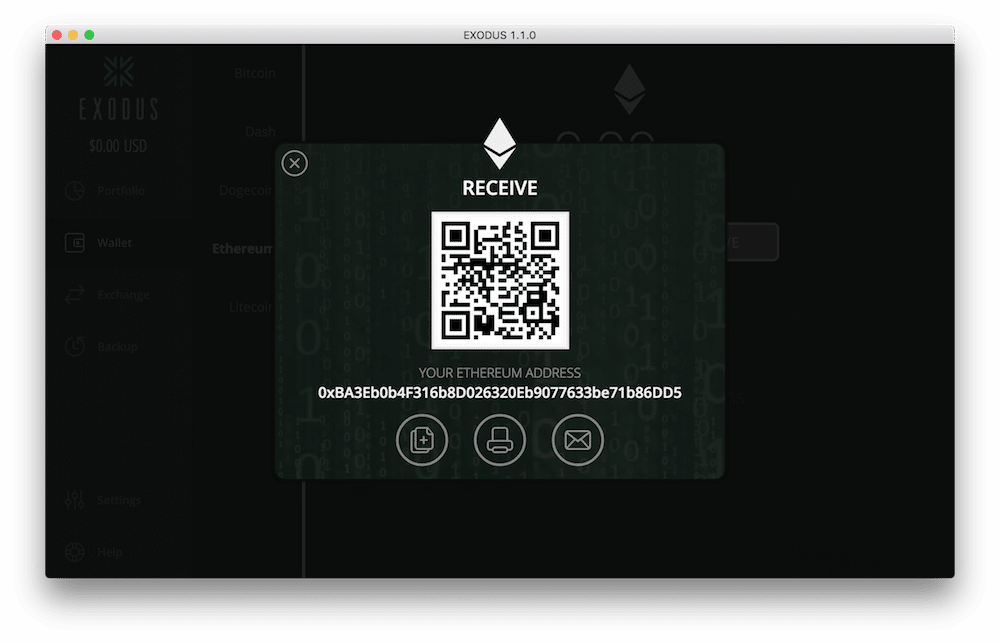
Click here to view Exodus for yourself.
Jaxx Wallet – The new kid on the block
While I haven’t fully reviewed Jaxx yet (I plan to do so next week), from my first impression it seems to be a very good Bitcoin and Altcoin wallet for all your devices (desktop and mobile). Similar to Exodus Jaxx provides a simple and intuitive interface for many altcoins.
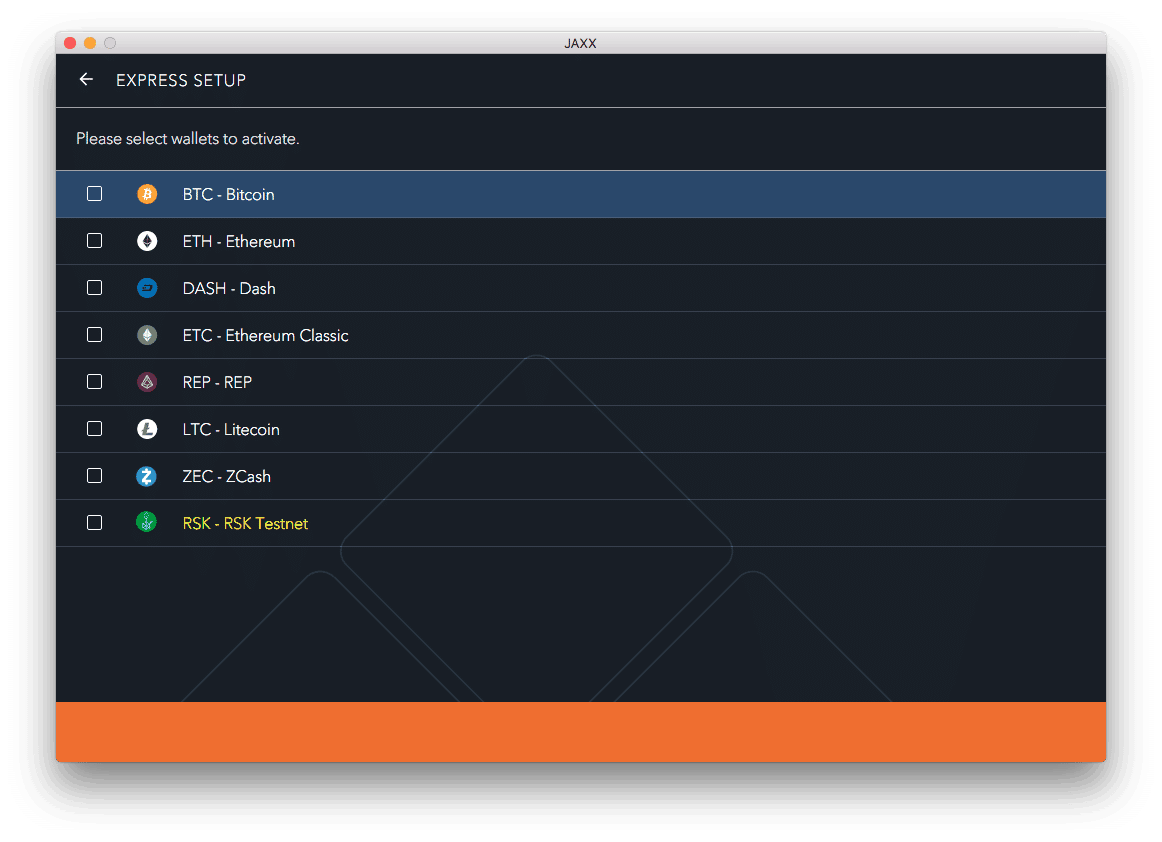
Unlike most other wallets out there Jaxx supports ETH and ETC. Also, your private keys are never shared with Jaxx’s server and are safely stored on your machine. Jaxx is not open source but the code is freely available on the wallet’s website which makes it a bit more accessible for review.
In order to receive Ethereum with Jaxx just make sure you have that currency set up when you first install the program. Then choose the currency on the top bar and you will see your Ethereum address right below.
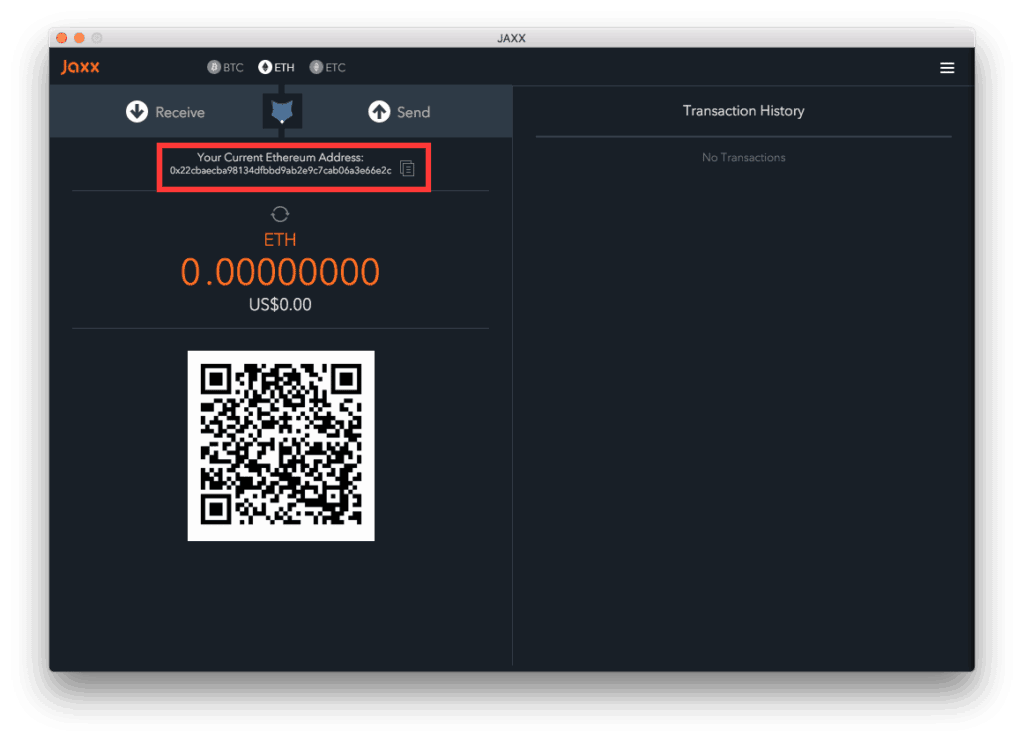
Click here to check out Jaxx for yourself
ETHAdress – The cold storage option
For those of you who wish to store Ethereum offline you can print out an Ethereum Paper wallet. ETHAdress is an open source project that will create Ethereum paper wallets for you. Similar to BitAddress.org, the site will create a private and public key pair with the click of a button. You can then print out this information and store it in a safe place so no external hacker will be able to get your coins.
One more option that’s available is to encrypt your private key so that if you or anyone else wants to use the coins they will need to know the password to decrypt it.

You should NEVER share your private key with anyone. In the image above my private key is publicly exposed but it’s because there are no coins in this wallet. The minute someone knows your private key he has control over your coins.
Using ETHaddress will probably be a relatively secure way of storing Ethereum. However, ETHaddress can be used only with ETH (not ETC). Also, if you ever want to send your coins to someone else you will need to import the keys into an online wallet (e.g. Exodus, Jaxx) and only then you will be able to use them.
Click here to visit ETHAddress.
MyEtherWallet – A web interface for Ethereum
MyEtherWallet is a website that allows you to create, send and receive Ethereum without it having any control over your private keys. When you first enter the site you can choose if you want to generate a wallet, send Ethereum or a variety of other options.
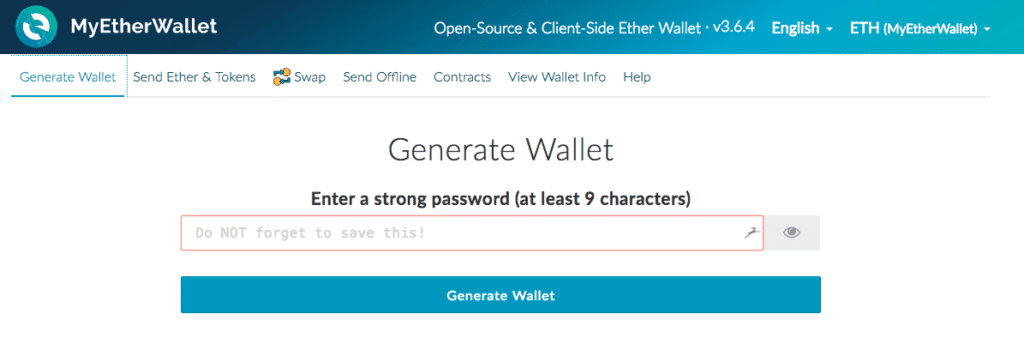
If you generate a wallet the site will create a public-private key pair which will be protected by a password of your choosing. You will then get a downloadable file with that key pair for future use. Whenever you will want to send Ethereum from this file you will need to upload it to the site and supply the password.
Sending can be done via the website itself or through other wallets such as TREZOR or Ledger. The site’s code is open source and it only works with ETH.
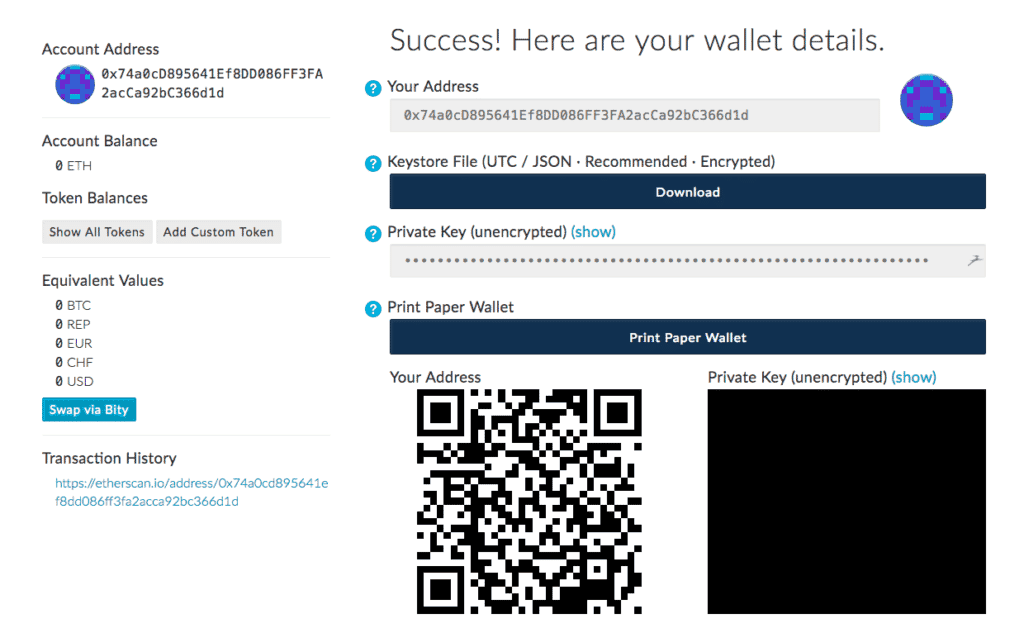
Click here to visit MyEtherWallet.
Ethereum wallets are still in their early days
Even though Ethereum has been around for a few years, as you can see from the variety above it’s not as popular as Bitcoin (yet). However, since Ethereum’s price is on the rise lately I guess we will be seeing more Ethereum wallets and exchange support for this currency soon.
At the time of writing there are also several exchanges that support Ethereum (e.g. BitPanda, Cex.io and more) however I don’t think it’s a good option to use them as wallets, that’s why I didn’t cover them in this post.
If you’ve had any experience with the wallets above or any other Ethereum wallet not mentioned here I’d love to hear about it in the comment section below.
Real time prices
"vires in numeris."
Receive all Bitcoinist news in Telegram!
Malicious Bitcoin Wallet Generation Software Could Produce Known Private Keys
An anonymous user on Pastebin has provided evidence that some wallet software may be generating private keys that can be easily discoverable, and therefore easy to take any bitcoins associated with that address. There has been no word on what wallet software is possibly affected, nor if this is a malicious act or a simple coding error.
TL;DR – Scroll to the last subsection
What is a Private Key?
I’m going to give a little bit of background and explain some terminology for those who don’t know how bitcoin works under the hood. The first thing is a private key. If you think of your bitcoin wallet address as a lock, the private key is the key used to unlock it and spend the funds inside.
When you generate a wallet on your device, whether it be on a computer or phone or whatever, what it actually does is generate a random set of numbers of letters and numbers (also known as a ‘string’) that is your private key. Your private key is the only thing that gives you legitimate ownership of your coins. Control of your private key is what allows you to spend the coins that are in your wallet. An example private key looks like this
Once your private key is generated, it is run through a hash function. A hash function is a mathematical function that, when you put a number or string it in, will return another string that has no relation back to the first number/string. It is very easy to find the second number from the first, but mathematically impossible to find the first from the second. The reason for this is that the sheer number of possible private keys is so large, it dwarfs the number of seconds since the dawn of the universe by several orders of magnitude. This second number is known as your public key, and this is hashed again to give you your Bitcoin wallet addresses. You can click here for more information about how private keys, public keys, and wallets work.
“Discovering” a Private Key
On to what is actually going on. Since a private key can be literally anything, you could technically take any phrase or string of numbers and letters and use it as your key. You could just throw anything into the hash function and generate the wallet. The public key would be derived from that, and you’d be on your way. This is generally not recommended since it goes to follow that if you can think of your private key so can someone else. It wouldn’t be truly random, which what is needed to create a secure wallet.
BrainWallet.io has a nifty tool that allows users to input whatever they’d like and then derive a private key/public key pair from that. Since the blockchain is an open public ledger, you can go look at some addresses that have been derived from common phrases. Someone used “satoshi nakamoto” to create a wallet, and the addresses associated have had small amounts of bitcoins sent to it, but they were cleared out immediately after. Other phrases like “I find your lack of faith disturbing” and “these aren’t the droids you’re looking for” also have been tagged with a small transaction. There’s no reason to use these as your keys because they’re insecure, but people have sent coins just to leave a mark on the blockchain.
Anonymous Pastebin Guy noted:
If you peer into the blockchain, you will find that people have ‘played’ with the chain by sending small amounts of bitcoins to addresses corresponding to private keys generated using Sha256… It’s quite obvious these were _meant_ to be found. It turns out there are a lot of these addresses. (Keep looking and you will easily find some.) This is nothing new and has been known to the bitcoin community for a while.
The user that posted these findings, who has chosen to remain anonymous, goes much further down the rabbit hole. He began thinking of other ways to “discover” common private keys and downloaded a complete index of all bitcoin addresses that were publicly available on the blockchain and started trying different things to discover keys that possibly had a few bits associated with them. It was kind of a pet project.
Testing Private Keys to Find Bitcoins
The Pastebin user started using pieces of data that are publicly available on the blockchain to see if any of them had been used to create wallets. He used block hashes for every block since the Genesis Block, Merkle roots from every block, common words and phrases that had been hashed multiple times, and finally started testing all bitcoin addresses. Most analysis of all bitcoin addresses will only involve addresses that have unspent balances, but he also decided to include addresses that had a balance of zero.
His first experiment involved checking every block hash to see if any of them had been used as a private key. This is kind of a smart way of remembering your private key, because you’d only need to know the block number to be able to go recover your key. Sure enough, over forty addresses existed that at one point over the past seven years been sent bitcoins. All of them had long been swept, but the user decided to keep investigating.
He then used the Merkle roots of some blocks to check for discoverable keys, and once again found addresses that had coins sent to them. Unfortunately, the balances were all zero, but the hunt was heating up. The third experiment was tested using common words that were hashed multiple times, such as “hello” or “sender”. The hashes of these words are then hashed again and again, giving another layer of added security and much less of a chance that the key will be discovered. If you can hash a word once, you can do it a million times. “hello” was hashed, and that hash hashed, over and over and eventually, it produced a private key that had been used. Several addresses were found using the method that all had transactions sent to them at one point or another. One of the funniest, in my opinion, is the word “password” which after hashing its 1,975 times you get a valid private key that has had funds sent to it. It’s very likely that the creator of this address was born that year.
The last experiment is where the user started asking some questions. He took his index of all bitcoin addresses and tested every public address to see if it had been used as a private key. And again, he searched a fraction of the blockchain and found dozens of addresses. The difference with many of these was that they had received and emptied the bitcoins associated with them within the last weeks or days.
The idea of using a public address as a public key doesn’t really make sense and is very risky because it is discoverable. These addresses were receiving bitcoin and taking it within minutes or hours of it being confirmed. At this point, Anonymous Pastebin Guy started to smell something fishy.
So, What’s Going on Here?
Pastebin Guy’s claim is that some third-party wallet custodial service, such as a mining pool, gambling site, or just a straight-up web wallet, may have malicious code in their backend that will generate private keys based on public addresses, allowing someone to easily steal the coins associated with the address as the private key is public knowledge on the blockchain. He goes on to say that this code has been at work for years, with bitcoins being siphoned out the whole time. He also makes it clear, however, that there is a chance that this is a simply a bug in the system that is creating non-random private keys.
The user created a bot to constantly scan these addresses and snag any bitcoin that was sent to them, and through dumb luck, he caught a transaction of 9.5 bitcoins to an address with a discover-able private key. Unfortunately, the bot was not working as expected and didn’t generate a transaction in time. The bitcoins were swept from the wallet, off to their next destination. He started getting very suspicious, however, and continued running the bot and noticed the same “collection address” being used for many of these key discovery methods. At least one address from all the methods was funneling bitcoin, bit by bit, to whoever was controlling this system. He was watching 6+ transactions come through his database of private keys per day.
/u/fitwear’s missing 9 BTC
A Reddit user by the name of /u/fitwear posted about his blockchain.info wallet getting hacked and getting just about nine bitcoins stolen. You can see the original Reddit post here. Blockchain.info support’s response was the typical “your account must have gotten compromised” canned reply, but in reality /u/fitwear had done everything right. A good password, proper two-factor authentication – none of it mattered and the coins were still gone.
The anonymous user from the Pastebin article managed to find the 9 bitcoins on an address to which he had a copy of the private key in his database. /u/fitwear was lucky and the user returned the coins to him/her, but further investigation of the address proved to be concerning.
According to /u/fitwear:
I entered the security key in Blockchain.info on my fully security enabled 2fa account & manually entered all of the information to avoid copy and pastes e.t.c……The 9 BTC left my account & hit my new block chain wallet. After 4 seconds it then bounced to a random address that I have no connection with a high transaction fee to push it through quickly. I’ve tried emailing support and they insist that someone must have my account information or I have some malware that has injected my copy & paste.
A compromised key managed to get imported into /u/fitwear’s blockchain.info wallet. Some non-blockchain.info-damning scenarios include someone compromised his account in the past and is just now claiming funds, or that there was some browser malware that affected the blockchain.info wallet. The thing that really doesn’t make sense is that if it was malware, it is logical that the developer would create a private key off of some private piece of info, not just some random address. The fact that it is a random address gives anyone who has caught on to this scheme a chance to take the coins before the hacker can send them to a wallet under his control. It just doesn’t add up.
The code that would be needed to generate discovered private keys is surprisingly simple – it’s just a couple of hash functions. If it was some third-party wallet provider, this bit of malware would be hidden among the thousands and thousands of lines of code that make up a back end. Also, this function wouldn’t draw too much attention during a code audit because it is just hashing a public address. Hence the hiding in plain sight analogy. If the malware was coded in a way that a private key was created that only the hacker and the hackee knows, that would be much more suspicious than coding a key generation system that produced an easily discover-able private key.
So, What Now? Are Cryptocurrencies Screwed?
While this data is very concerning, Bitcoin’s underlying security is not affected. 99.999% of private keys that are generated are generated randomly, and if a key is generated with a proper level of entropy, or randomness, it is statistically impossible for someone to discover your keys. Back to the number of seconds since the birth of the universe example, trying to discover a randomly generated key would be like trying to guess one specific second out of all the seconds from then until now. It is ridiculously unlikely that you would even guess the same year, let alone the same month, day, hour, minute, or second. If you are using a private wallet where you control the private keys, you are 100% not affected.
The people who should be concerned about this are those with coins held by custodial third parties, such as exchanges or web wallets. However, I want to make it very clear that there is ZERO direct evidence proving blockchain.info or anyone else had direct involvement in /u/fitwear’s theft or any other weird transaction that the user found on the blockchain.
Basically, rest easy. If you control your own private keys and they were generated randomly, you have no chance of being affected by this possible attack vector. If you want to read more about this user’s findings, you can read the whole Pastebin article here.
What do you think about this possible exploit? Are you securing your coins accordingly? Have any more questions? Let us know in the comments below!
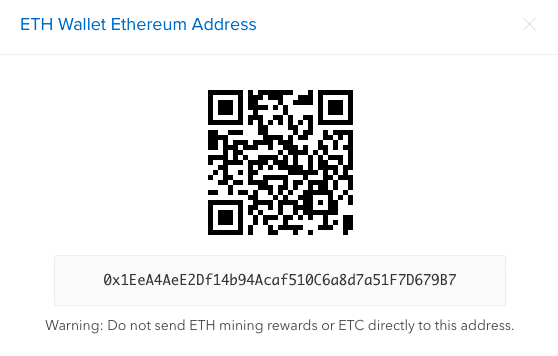
Комментариев нет:
Отправить комментарий